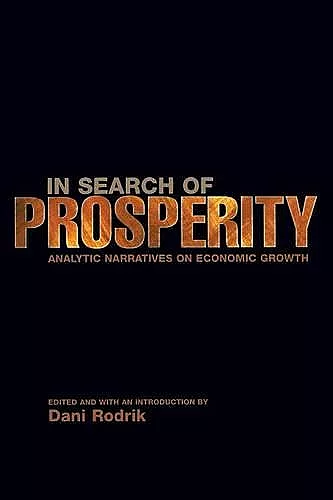In Search of Prosperity
Analytic Narratives on Economic Growth
Format:Paperback
Publisher:Princeton University Press
Published:20th May '03
Currently unavailable, and unfortunately no date known when it will be back

This is a timely and important volume featuring new work from a super line-up of authors. At a time when more than a few growth narratives nod politely to sentiments such as 'one size doesn't fit all' and 'context matters,' but then proceed to torture a single model to explain the fortunes of--or provide policy advice to--two hundred vastly different countries, it is a delight to find a group working to take both the model(s) and the countries themselves seriously. This collection contains arguments, evidence, and implications that deserve a wide hearing in both academic and policy circles. -- Michael Woolcock, World Bank and Harvard University This valuable collection fills a gap between the empirical growth literature and work by area specialists. The essays present narrative evidence on the importance of many things economists believe matter for growth. Several present new stylized facts, many of which will undoubtedly keep development and growth economists busy for some time to come. -- Chang-Tai Hsieh, Princeton University
The economics of growth has come a long way since it regained center stage for economists in the mid-1980s. This work is a series of country studies guided by that research. It sheds light on some of the important growth puzzles such as how did China grow so rapidly despite the absence of full-fledged private property rights.The economics of growth has come a long way since it regained center stage for economists in the mid-1980s. Here for the first time is a series of country studies guided by that research. The thirteen essays, by leading economists, shed light on some of the most important growth puzzles of our time. How did China grow so rapidly despite the absence of full-fledged private property rights? What happened in India after the early 1980s to more than double its growth rate? How did Botswana and Mauritius avoid the problems that other countries in sub--Saharan Africa succumbed to? How did Indonesia manage to grow over three decades despite weak institutions and distorted microeconomic policies and why did it suffer such a collapse after 1997? What emerges from this collective effort is a deeper understanding of the centrality of institutions. Economies that have performed well over the long term owe their success not to geography or trade, but to institutions that have generated market-oriented incentives, protected property rights, and enabled stability. However, these narratives warn against a cookie-cutter approach to institution building. The contributors are Daron Acemoglu, Maite Careaga, Gregory Clark, J. Bradford DeLong, Georges de Menil, William Easterly, Ricardo Hausmann, Simon Johnson, Daniel Kaufmann, Massimo Mastruzzi, Ian W. McLean, Lant Pritchett, Yingyi Qian, James A. Robinson, Devesh Roy, Arvind Subramanian, Alan M. Taylor, Jonathan Temple, Barry R. Weingast, Susan Wolcott, and Diego Zavaleta.
"Any book written or edited by Dani Rodrik is likely to be interesting and thought-provoking, and often iconoclastic. This volume is no exception... [I]t is a good volume of case studies, and may serve the added benefit of making US-based development economists attach more value to country studies of the determinants of growth."--Oliver Morrissey, Journal of International Development
ISBN: 9780691092690
Dimensions: unknown
Weight: 680g
496 pages